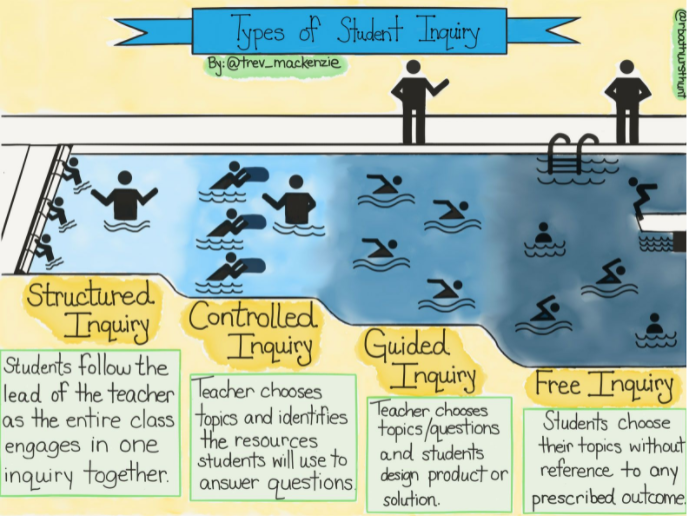September 2021 Blog
Inquiry-Based Instruction

Published by: Michaela Dodson - Instructional Designer
September 2021
“Google it”. What do you do when you want to know how to make a recipe, fix your garage door, review a product, or if it is going to rain? “Google it” is a popular phrase we use to do just that. Google has become a common tool for instant knowledge gratification and DIY. It is in our human nature to inquire about something and then research it. How can we carry that same desire for inquiry into the classroom?
John Dewey’s philosophy is that education begins with the curiosity of the learners. Inquiry-driven lessons in theclassroom place the responsibility for learning on the students. It also allows the students to research, evaluate and understand concepts by themselves. “Inquiry-based learning is one approach to improving the quality of undergraduate education by moving toward more student-directed, interactive methods of learning while focusing on learning how to learn” (Justice et al. p.1, 2009). Here is a great quick video that describes inquiry (Spencer, 2017). Inquiry-based learning (IBL) starts with an orientation or hook, followed by a question to which students form a hypothesis. Students are then given time to explore and experiment, interpreting data along the way to form conclusions. Inquiry can come in all different forms and sizes. It can be categorized into four different types ranging from most guided to the least guided by the instructor. All four forms start off with a question to hook the student’s curiosity, then designated time for them to research, reflect, evaluate and conclude their findings.
Limited/Confirmation Inquiry – Students confirm a principle through an activity when the results are known in advance.
Structure Inquiry – Students investigate a presented question through a prescribed procedure.
Guided Inquiry – Students investigate a teacher-presented question using student-designed/selected procedures.
Open Inquiry – Students investigate questions that are student formulated through student-designed/selected procedure (Banchi and Bell, 2008 as cited in Inquiry in Education, n.d.)A few examples of (IBL)
- Provide students with a current real-life issue or problem. Have students review the information and create a unique approach to solving the problem.
- Give students basic information regarding a scientific approach. Have them research and recreate the study with a different or better alternative.
- Students ask their own questions and then design their own product -Students explore a concept and create their own math problems.
- Mythbuster style science inquiry (Question and Test)
IBL encourages self-direction, collaboration, and critical thinking which are crucial transferable skills for life beyond college.In alignment with the Amarillo College strategic plan, we must do everything we can to “Reimagine, integrate, and extend student success strategies, improve student engagement and enhance the use of learner-centered pedagogy and high impact practices”. It is the mission of Amarillo Colleges’ Center for Teaching and Learning (CTL) to “promote transformative, evidence-based, and engaging professional learning”. We offer Professional Learning Cohorts and individual consultations to help ensure the academic success of all students at AC.Have more questions about inquiry?…..I encourage you to “Google it” or come by and see us!
References
Spencer, John. “What Is Inquiry-Based Learning?” [video] YouTube, 5 Dec. 2017, www.youtube.com/watch?v=QlwkerwaV2E.
Banchi, H., Bell, R. (2008). The Many Levels of Inquiry. Science and Children, 46 (2),26-29. Retrieved from "4 Levels of Inquiry - Inquiry in Education -WordPress.com." https://inquiryineducation.wordpress.com/4-levels-of-inquiry/.
Justice, Christopher, et al. “Inquiry-Based Learning in Higher Education: Administrators’Perspectives on Integrating Inquiry Pedagogy into the Curriculum.” HigherEducation, vol. 58, no. 6, 31 Mar. 2009, pp. 841–855, 10.1007/s10734-009-9228-7.
"Trevor MacKenzie - Dive into Inquiry - Classroom 2.0 LIVE!." 24 Feb. 2018, http://live.classroom20.com/archive-and-resources/category/trevor-mackenzie.
"4 Levels of Inquiry - Inquiry in Education - WordPress.com." https://inquiryineducation.wordpress.com/4-levels-of-inquiry/.
Contact Us
Student Help - The Underground
Ware Student Commons, Basement
Phone: (806) 371-5429
Email: ctlstudenthelp@actx.edu